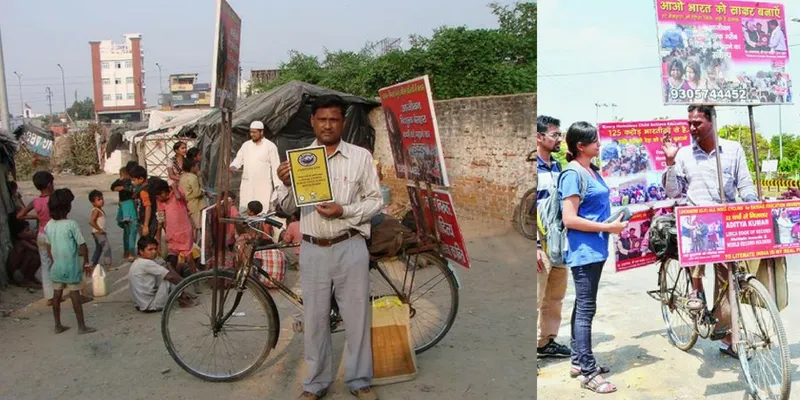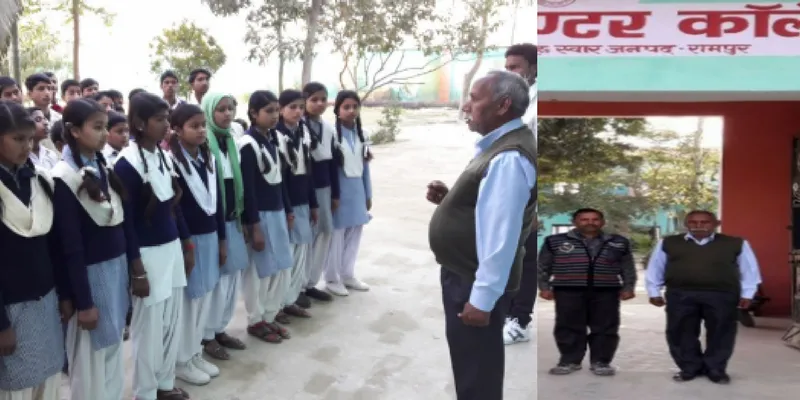Small towns, big problems: meet the people who are leading a silent revolution in the Indian hinterlands
These 10 people have gone on to create change and impact in parts of rural India grappling with serious issues like farmer suicides, child trafficking, lack of education, and more.

India, while gloriously pluralistic, also deals with a range of complex issues, social injustices, environmental problems, and economic challenges.
YourStory brings to you stories of 10 individuals who refused to blame the system, and took up the mantle in the battle against various issues faced by people.
Kalyan Akkipeddi

Kalyan Akkipeddi, who gave up a lucrative job in the finance and marketing division at General Electric to travel around the country's villages in search of knowledge, arrived at remote Tekulodu, a rural hamlet in Anantapur district in Andhra Pradesh. Shaken by the shortage of water and the despair of farmers in the semi-arid zone, Kalyan (39) decided to "intern" with a farmer family and helped them increase their income from Rs 7,000 a year to about Rs 14,000 a month by putting scientific practices in place and tapping natural resources such as solar and wind power.
In 2013, he bought a 12.5-acre plot of land a few kilometres from Tekulodu, on the forest fringe near his home town Hindupur, in the same district of the Rayalaseema region. This has evolved into what he named ProtoVillage -- the prototype of an ideal village. Today, famous for its self-sustaining model, the village boasts of a Wi-Fi facility, provides entrepreneurial opportunities to farmers and has its own syllabus for children. Even as many parts of rural India still lack the basic amenities, Kalyan’s village is a sustainable development model of water conservation, power generation, ending gender bias, and even eliminating caste bias by way of cooking and sharing food.
Mahadevi Nandikolmath

Twenty-eight years ago, newly-wed Mahadevi Nandikolmath wanted to end her life. Married off at the age of 13 into a poor family, hope came to her in the form of a seer who advised her to start afresh. Taking his advice, she started a roti-making business.
Today, with four operational centres, she is famously called 'Rotti Mahadevi'. By employing over 100 poor women, including widows, Mahadevi is changing the status quo for many. She runs the Veerabhadreshwara Food Supplies at Shivaji Nagar, Bhavani Nagar, Ashraya Colony and Manikeshwari Colony, in Kalaburgi (Gulbarga), Karnataka.
Rajiv Ghosh

Seventeen-year-old Rajiv Ghosh is a Class XI student from Siliguri. A tinkerer since childhood, Rajiv has built a drone to help Siliguri, the town in North Bengal, fight the menace of dengue. The drone is fitted with a high resolution camera which helps track dengue-causing mosquito larvae. What makes Rajiv's accomplishment inspiring is his story.
Rajiv's father, Ranjit Ghosh, runs a small tea stall in Siliguri. Juggling his studies while helping out his father, Rajiv could not afford to pursue science due to low marks in Class X. However, this did not deter the young man and he started building a drone to help his town fight the menace of mosquitoes last year. He needed Rs 1.5 lakh to built the drone, a sum which was raised with help from his parents and neighbours.
Nileema Mishra

Nileema Mishra was born into a middle-class family in Bahadarpur village of Maharashtra. She grew up witnessing farmer suicides and other social injustices. When she was 13, she decided to commit her life to solving them. Three decades later, she has given everything she can to transform the lives of thousands of rural Indians and became one of the youngest recipients of the Magsaysay Award a few years ago.
In the 1990s, Nileema finished her Master's in Clinical Psychology from Pune. Instead of taking a job there and settling into a comfortable urban life, she returned to her hometown to work for the betterment of people in Jalgaon district. After returning, Nileema realised that the major reason behind people's misery was a lack of money. So, she started Bhagini Nivedita Gramin Vigyan Niketan (BNGVN) to provide micro-credit to underprivileged women. Over time, BNGVN have become the go-to place for people aspiring to attain sustainable livelihood of any kind from more than 200 villages in the state.
Mittal Patel

Mittal Patel, who was raised in a village of Gujarat, Sankhalpur village in Mehsana district, dreamt of becoming an IAS officer. However she soon realised that she wanted to work for the tribal community.
Mittal (35) started an NGO called ‘Vicharta Samuday Samarthan Manch’ (VSSM) to solve the problems of the women were sexually abused, and their children who had no choice but to live the life carved out for them. She arranged to provide education to the tribal children in a tent, and struggled to get voter cards made for them. Voter cards have now been made for nearly 20,000 people.
Mittal has been working with 28 nomadic tribes and 12 notified tribes (NT-DNT) for the past 10 years.
Aditya Kumar

For the last 23 years, Lucknow-based Aditya Kumar has been riding around a cycle while hosting a mobile classroom in Lucknow. Today, a teacher to many underprivileged students, he is a Limca record holder. Dedicated to the cause of education, he does not charge for his classes. On most days, he stages an impromptu outdoor lesson. Aditya has been cycling and hosting mobile classrooms across Lucknow since 1995. He's also earned accolades from Uttar Pradesh governor Ram Naik and former Chief Minister Akhilesh Yadav.
Hailing from a humble background in Salempur, a small village in Farrukhabad district of Uttar Pradesh, Aditya was born to a poor labourer. As his parents forced him to lend a helping hand, he ran away from home as a teenager and was living on the streets until a teacher spotted him and helped him with his college education. He says he has been teaching 200 children every day.
Shadi Ganz

Cognitive psychotherapist and scientist Shadi Ganz developed India’s first fully equipped mobile breast and cervical cancer screening bus in Tamil Nadu. A German national living in India, Ganz is also a philanthropist and a contemporary artist. A breast-cancer survivor herself, she hopes to help other patients with early screening through Shadi Ganz Foundation Mammomobile Charitable Trust. She built Mammomobile for Rs 2 crore, all by herself. So far, the bus has toured 92 villages in the Villupuram district of Tamil Nadu and conducts 500 mammograms per month.
The bus is designed with different compartments containing machinery imported from the US to be able to diagnose patients and deliver instant results. There’s a section for conducting mammography and a control room to get the test results. It also houses a section to examine women for cervical cancer. The results are immediately checked by a team of doctors at The Cancer Institute in Chennai.
Hasina Kharbhih

Forty-seven--year-old Hasina Kharbhih, a Fellow from Ashoka University, is ensuring that the girls who were once victims of human trafficking can lead normal lives. Human trafficking is a massive $32-billion industry in India, and minor girls comprise 40 percent of sex workers in the country.
Hasina introduced the ‘Meghalaya Model’, which has been adopted by eight North-Eastern states over the past 10 years, to prevent child trafficking. The Meghalaya Model is a single-window platform that records, compiles, and keeps track of relevant information on human trafficking cases, adhering to the following steps: Reporting, Rescue, Rehabilitation, Repatriation, Re-integration, and Re-compensation through partnership with NGOs, policing, press, and prosecution. Hasina formed the Impulse Case Information Centre (ICIC) which has a network of 1,000 NGOs and government departments across Southeast Asia. The model works on the concept of need-based intervention and has collaborated with various organisations to fight human trafficking.
Hasina has been fighting for over two decades to end trafficking in the Northeast and, so far, has saved 72,442 people and empowered over 30,000 women artisans, through her Impulse NGO Network (INGON).
Keshav Saran

In 1989, a village pradhan walked into every household in Rampur village of Uttar Pradesh with a single motive: education. A village that up till then did not have a school nor see the need for one dismissed his idea. But this lack of interest did not deter Keshav Saran, who went on to make his dream of bringing education to his village’s children come true.
Today, along with his son and daughter-in-law, he runs a school in Rampur with 1,320 students, of which 670 are girls. Keshav gave up his four-acre agriculture land to build a school in the village. He also started teaching the older community in the evenings. In 2017, 450 students from Class X and Class XII gave their board exams.
Rohit Mehra

With a space sporting 37,000 plants, the Ludhiana Railway Station is not only the first station in Punjab to have a vertical garden, but also the first in the country. With an aim to reduce the use of plastic, and add more greenery to the campus, the initiative was inaugurated on Income Tax Day on July 24, 2018. This initiative is the brainchild of Rohit Mehra, an Internal Revenues Services officer.
A vertical garden not only helps in longevity of a wall as it protects it from extreme weather conditions, but also helps in lowering the indoor temperature by almost five degrees Celsius.
Rohit drew inspiration from a visit to Sri Lanka, where he saw vertical gardens in home terraces too. Instead of using new plastic pots, he promoted the usage of plastic bottles that are used for packing water and aerated drinks. He did a pilot project at his house and on its success, he took it forward to his own office, where today he houses over 18,000 bottles.







